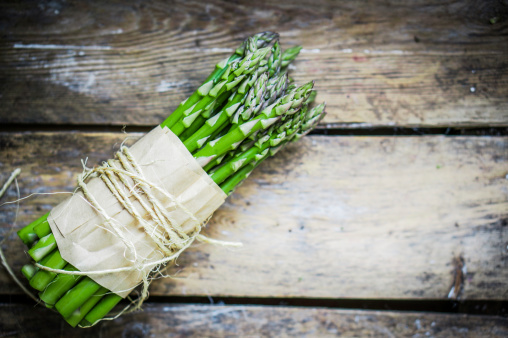The pregnancy vegetable
Asparagus is packed with B vitamins vital for the nervous system and maintaining energy. This power-packed vegetable contains plenty of folic acid, alongside vitamin B1, B2 and B6, niacin and choline. The folic acid content makes this the perfect vegetable for pregnant women to feast on – research shows that a good intake of folic acid during pregnancy reduces the risk of birth defects such as spina bifida. The mineral (zinc and magnesium particularly) content is also good for a growing foetus and helps protect against low birth weight. Because asparagus contains high levels of the amino acid asparagine, it is helpful in cases of oedema, better known as fluid retention, which is common in pregnancy. Asparagine works as a natural diuretic and enables the body to release excess salts.
Why it’s good for you
Not just for pregnant women, asparagus is packed with plenty of other health benefits. The B vitamins help to regulate homocysteine levels in our blood making it a good choice for those at risk of heart problems – homocysteine is an amino acid which in high doses has been linked to heart disease. Asparagus is also rich in glutathione, a compound which helps to break down free radicals and pathogens in the body. Research shows that for this reason asparagus is particularly useful in protecting against and fighting some cancers. Other research shows that asparagus can reduce the risk of diabetes by “improving insulin secretion and ?-cell function, as well as the antioxidant status”. As a natural diuretic, it can help to prevent kidney stones by flushing out the kidneys. With relatively high levels of beta-carotene, vitamin C, vitamin E, vitamin K, thiamin, riboflavin, rutin, niacin, folic acid, iron, phosphorus, copper, potassium, selenium and manganese, asparagus offers many health benefits. Vitamin K is essential for strong bones and has been linked to a decrease in the likelihood of getting Alzheimer’s Disease. One of asparagus’s most well-known attributes is its effect on the libido. Some say this is because eaten with the fingers, it is a seductive pleasure in itself, but the folic acid also helps both men and women to reach orgasm. All the more reason to enjoy this super vegetable!
How to serve asparagus
The most important thing is to eat it as fresh as possible. As it dehydrates quickly, it can become woody and tough in a short amount of time, so get it from a local farm to ensure it’s freshly picked. Better yet, grow asparagus yourself so you can enjoy it fresh from the garden (it’s also expensive, so growing your own saves money). The Royal Horticultural Society (RHS) offers tips on how to grow it here. Asparagus is one of those vegetables which suits being served as simply as possible – the flavour and crunch are at their best when it is just grilled and buttered (with a nice pot of hollandaise sauce as an optional extra). The British Asparagus website is packed with nutritious and mouth-watering recipes that make the most of the season. Salivate over such delights as Asparagus, Pancetta and Parmesan Linguine with Chive Cream, and Asparagus, Pea and Goats Cheese Souffles. There’s even a 2 week Asparagus Diet devised by nutritionist and author Fiona Hunter to get your body feeling springy and fresh.
Make the most of this fantastically healthy and delicious green vegetable while it’s in season, and then get ready to grow for next year.







